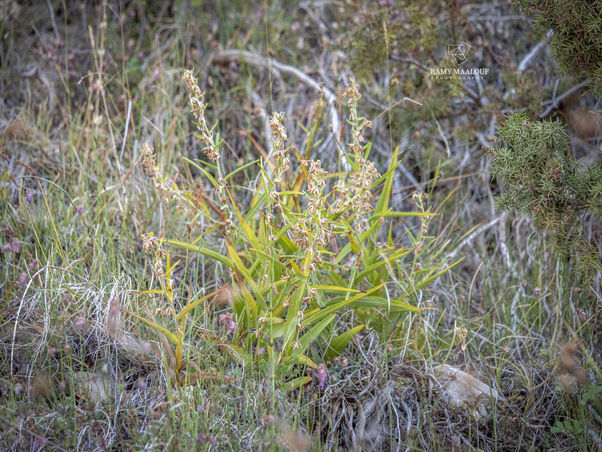Family |
Orchidaceae
Epipactis veratrifolia
Boiss. & Hohen.
Epipactis veratrifolia Boiss. & Hohen.
(First published in P.E. Boissier, Diagn. Pl. Orient. 13: 11; 1854. Treated in Nouvelle Flore du Liban et de la Syrie, vol. 1, Pl. CVII nº 1; 1966, as E. consimilis Don.)
• Life-form & habit: Robust perennial orchid with creeping rhizome bearing stoloniferous roots. Stems erect, 30 – 100 cm, glabrous at the base, papillose-pubescent upwards.
• Leaves: Numerous, ensiform, semi-amplexicaul, 20 × 2–3 cm, acute; upper progressively smaller.
• Inflorescence & flowers: Spike 20 – 30 cm, many-flowered. Bracts leafy; flowers nodding, pedicels pubescent. Perianth brown-purple with greenish lines; lip 1 cm, hypochile narrow, epichile subtrilobed.
• Fruit: Capsule.
• Phenology: April – June.
• Habitat & elevation: Humid sites, marshy ground, stream margins, 200 – 1 500 m.
• Lebanese distribution: Nahr Beirut, Nahr el-Kalb, Kahalé, ‘Araya, Beit Méri, Faraya, Afqa, Bcharré, Cedars, Akkar.
• Native range: Afghanistan, Assam, China South-Central, Cyprus, East Himalaya, Ethiopia, Gulf States, India, Iran, Iraq, Lebanon-Syria, Myanmar, Nepal, Oman, Pakistan, Palestine, Saudi Arabia, Sinai, Somalia, Tibet, Transcaucasus, Turkmenistan, Turkey, Ukraine, West Himalaya, Yemen (POWO).
• Conservation notes: Rare in Lebanon due to destruction of humid stations (Beirut river population extinct). Threatened by drainage, pollution, urbanization, and pine tree afforestation in montane valleys.
• ⚠️ Taxonomic note: Sometimes treated as E. consimilis Don; currently accepted as E. veratrifolia.














